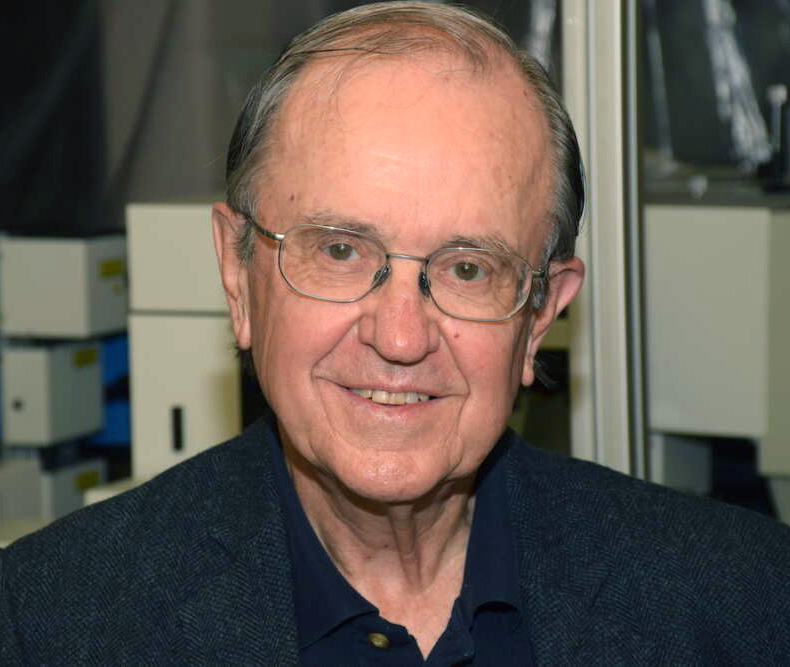
Amid growing calls for reducing atmospheric greenhouse gases, a University of Guelph chemist has received more than $3 million in funding for an ongoing research program intended to enhance sustainable nuclear power.
Dr. Peter Tremaine, a professor in the Department of Chemistry, will use federal and industry funding worth nearly $3.3 million and the University Network of Excellence in Nuclear Engineering (UNENE) Research Chair to continue his pioneering studies of high-temperature water chemistry.
That research will help the Canadian and international nuclear industry optimize operation of existing nuclear power reactors, further develop a new reactor design and assist in licensing of an eventual geological storage site in Ontario for spent nuclear fuel.
Referring to the Paris climate agreement, Tremaine said, “Canada has made a major commitment to carbon reduction and greenhouse gas reduction. Nuclear power is an important part of the solution. The award of the UNENE Research Chair is a vote of confidence from the industry.”
The five-year chair and the new funding — $2.1 million from the Natural Sciences and Engineering Research Council (NSERC) Alliance program and almost $1.2 million from industry collaborators – “is a contribution that fits well into the University of Guelph’s commitment to a sustainable energy economy,” he said.
UNENE is a consortium of nuclear power utilities and government research labs, including Ontario Power Generation, Bruce Power Ltd. and the Canadian Nuclear Laboratories. Tremaine’s chair also includes independent funding from the CANDU Owners Group, the Nuclear Waste Management Organization (NWMO) and the Electric Power Research Institute.
Tremaine’s long-standing research into high-temperature and high-pressure water chemistry helps underpin current and potential nuclear power generation in Canada and abroad.
His lab is one of only a few worldwide that can provide accurate thermochemical data needed to model water chemistry under the high temperature (up to 373 C) and pressure conditions found in nuclear power reactors.
“We use specialized physical chemistry techniques that allow us to understand and quantify water chemistry under reactor operating conditions and model reactions that control activity transport and corrosion,” he said.
The research uses high-precision instruments with tiny cells made from exotic materials to withstand the conditions encountered in high-temperature aqueous conditions.
“The data we generate is used in internationally accepted models allowing operators to control water chemistry and troubleshoot any problems that arise. Few other labs can measure these parameters directly.”
Tremaine plans to look at three topics. His research helps optimize the chemistry of current CANDU reactors used in Canada and abroad. Those reactors produce about 65 per cent of Ontario’s electricity and are virtually carbon-free.
Many current reactors are being refurbished to extend their lifetimes for another four decades. (The Pickering, Ont., reactors – the first large-scale commercial CANDU reactors installed in the province – will cease commercial operation in 2025.)
“Our research contributes to the continued long-term operation of the CANDU fleet,” said Tremaine.
In 2019, four provinces, including Ontario, signed an agreement to develop small modular reactors, a new class of reactor designs. His studies of water chemistry will help ultimately in licensing of these new reactors in Canada.
Tremaine will also continue similar research on water chemistry needed to evaluate potential underground storage sites for engineered containment of spent nuclear fuel from power generation reactors. Two candidate sites in Ontario are currently being considered by the NWMO.
“The evaluation of the two sites is ongoing and includes chemical modelling to predict how the site will evolve over hundreds of thousands of years.”
The new NSERC funding will support grad students, post-docs and other researchers in his lab and will enable Tremaine to update sophisticated equipment.
He said a novel aspect of the chair and the grant is his close ties with many Canadian nuclear industry and government partners.
“It’s very much a two-way partnership that ensures the research focuses on nuclear industry needs and, at the same time, yields results of lasting scientific value,” he said. The new funding and the chair will “allow us to apply the novel techniques we have developed and transfer the technology to the Canadian nuclear power industry.”
Tremaine has spent his career applying high temperature and pressure studies to energy applications, including nuclear and thermal power generation, Alberta oil and gas production, and carbon capture and sequestration.
He credits the contributions of lab manager and senior research associate Dr. Jenny Cox, research associates Dr. Swaroop Sasidharanpillai and Dr. Hugues Arcis (now at the U.K. National Nuclear Laboratories), as well as post-docs, students and partners.
“Our programs require deep expertise in many highly specialized experimental methods. We need skilled program management, expert researchers in each key area, engaged students and ongoing involvement from our industrial partners in order to achieve success.”
Contact:
Dr. Peter Tremaine
tremaine@uoguelph.ca